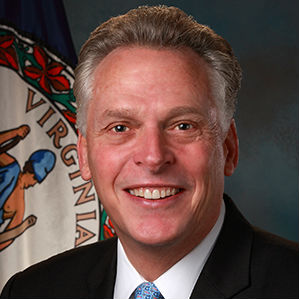
“This executive order reflects the approach that my administration and I will take to building a new Virginia economy during my term,” said Governor McAuliffe. “If we are going to compete in the global marketplace, now is the time to work together to balance our budget responsibly, protect and expand our world class infrastructure and education systems, and increase our efforts to bring innovative companies here to create jobs and help diversify our economy.”
NUMBER TWENTY SIX (2014)
ESTABLISHING THE NEW VIRGINIA ECONOMY
STRATEGIC PLAN AND STEERING COMMITTEE
Importance of the Taskforce
The Commonwealth of Virginia features vast natural and human resources that serve as the foundation of our economic strength. Our unparalleled educational system, highly educated workforce, competitive business climate, central mid-Atlantic location, and premium infrastructure have afforded Virginia years of recognition as a preeminent state for business and job growth.
Virginia is well-positioned to capitalize on opportunities in various high-growth industries with high-wage employment, including healthcare, bio sciences, cyber security, and energy. According to the Information Technology and Innovation Foundation, the Commonwealth ranks among the nation’s best knowledge-based, globalized, entrepreneurial, IT-driven, and innovation-based economies. Moreover, Virginia has one of the largest higher educational systems and among the most educated populations in the nation.
Virginia is an international gateway to move people and products quickly and efficiently, with fourteen commercial airports, including Dulles International. We offer the third largest state-maintained transportation network with six major interstates, an extensive railroad system, and a technologically-advanced port, capable of handling Post Panamax vessels. With agriculture as our largest industry, the Commonwealth will use these assets as we seek to increase agriculture and forestry shipments worldwide and to become the East Coast capital for agricultural exports.
While Virginia enjoys inherent advantages and assets, we are facing unique economic headwinds. Recent federal budget cuts, reductions in defense spending, and the impact of sequestration have presented pressing challenges for Virginia’s economy. In this season of federal contraction, we must balance public and private sector enterprise for fiscal resilience. This vital imperative can be achieved by enhancing our fundamentals and addressing our challenges as an opportunity. By recalibrating our fiscal pathway and focusing our efforts on diversified, sustainable, and prospering industry sectors, the Commonwealth will excel in the global marketplace strengthened by a New Virginia Economy.
Establishment of the Steering Committee
By virtue of the authority vested in me as Governor under Article V, Section 1 of the Constitution of Virginia, and Section 2.2-205 of the Code of Virginia, I hereby establish the Governor’s New Virginia Economy Steering Committee (Steering Committee). The purpose of this Steering Committee is to create a four-year strategic plan for economic development, in collaboration with the business community, local and state officials, and economic development professionals.
The Commonwealth must attract new jobs and investment, and cultivate the next generation of job creators and entrepreneurs. My administration’s four-year strategic plan will focus on: 1) enhancing our infrastructure, 2) diversifying and growing our strategic industry sectors, 3) solidifying and promoting our competitive business climate, 4) nurturing a sustainable entrepreneurial environment, and 5) equipping Virginia’s workforce with in-demand skill sets to meet current and future business needs. The plan will also recommend specific executive and legislative actions to achieve these goals.
Composition of the Steering Committee
The Secretary of Commerce and Trade will chair the Steering Committee. The Steering Committee will be composed of the Secretaries of Agriculture and Forestry, Finance, and Veterans and Defense Affairs, as well as the Secretaries of Administration, Education, Health and Human Resources, Natural Resources, Technology, and Transportation, as specified in Section 2.2-205 B of the Code of Virginia. The Steering Committee will engage representatives of relevant state agencies, local and regional economic development organizations and chambers of commerce, leaders in sectors significant to Virginia’s economy, and other organizations or individuals as designated by the Governor.
Strategic Plan Priorities:
The four-year strategic plan will address five economic development priorities:
- “Project Ready” Infrastructure – Virginia must ensure that our infrastructure assets and resources, such as healthcare, energy, housing, and broadband are ready to attract small, medium, and large scale projects throughout the Commonwealth and advance our competitive position locally, regionally, and globally.
- Diversified High-Growth Industries – Virginia must devote vital resources to strengthen thriving industries, while diversifying targeted high-growth industry sectors and expanding trading partnerships.
- Preeminent Business Climate – Virginia must ensure that tax, regulatory, and incentive policies sustain Virginia’s position as the best state to start, grow, and locate a business.
- Innovation and Entrepreneurs – Virginia must pursue policies and public-private partnerships that attract talent, promote business and social entrepreneurship, business development and investment, and encourage the creation and commercialization of new products and services.
- “Skills to Jobs” Workforce – Virginia must align higher education system priorities and resources to supply in-demand workers, transition veterans, and meet current and future employer needs, in the private and public sectors.
Staffing
Staff support for the Steering Committee will be provided by the Office of the Governor, the Office of the Secretary of Commerce and Trade, the various secretariats and their agencies represented on the Steering Committee, and other agencies as may be designated by the Governor. All executive branch agencies will cooperate fully with the Steering Committee and will render such assistance as may be requested by the Chair. The Secretary of Commerce and Trade will ensure coordination between the development of the New Virginia Economy Strategic Plan and the Workforce Initiative.
The Steering Committee will provide a report to the Governor by no later than December 1, 2014, setting forth the Commonwealth’s proposed economic development strategic plan. The Steering Committee shall report annually to the Governor by no later than December 1 on progress toward achieving the goals established in the strategic plan.










